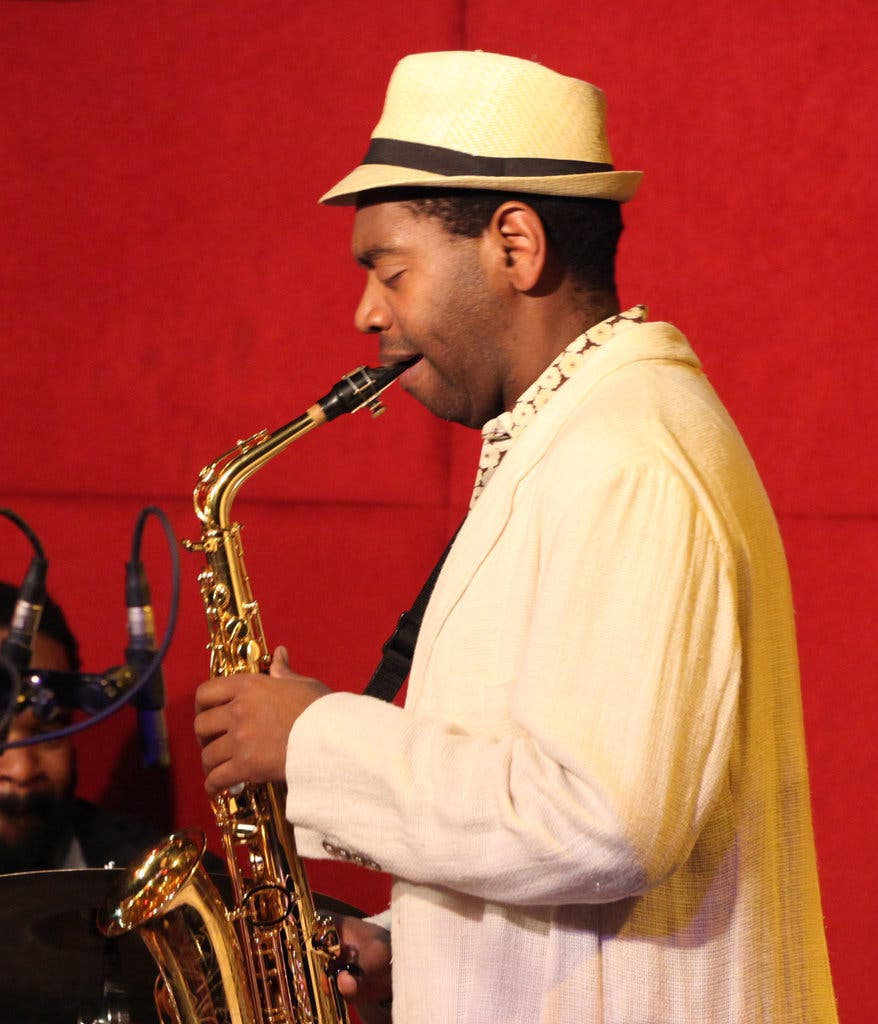Yosvany Terry, a vital figure in the exploration of Afro-Cuban music, bridges his rich heritage and extensive musical education to breathe new life into the rich tapestry of jazz. As a senior lecturer at Harvard and director of the Harvard Jazz Orchestra, he seamlessly weaves West African traditions into his教学 and performances, highlighting their profound influence on modern musical forms. Recently, his travels to Benin and Cuba helped him uncover vital connections between these cultures and their enduring impact on artistic expression. With a commitment to expanding the relevance of the arts through cross-departmental collaboration, Terry is not only an educator but also a curator of an ever-evolving musical dialogue. His upcoming performance at ArtsThursdays promises to showcase the cultural treasures he has gathered through his research, offering audiences a glimpse into the intricate interplay of history and contemporary artistry.
As a pivotal force in contemporary jazz, Yosvany Terry embodies the fusion of diverse cultural influences, particularly those rooted in African and Cuban musical traditions. His recent explorations into the musical heritage of Benin illuminate the historical dialogue that has shaped various genres, including jazz and its Afro-Latin roots. By engaging with both students and fellow artists at Harvard, Terry promotes an enriched understanding of these musical legacies, facilitating a deeper appreciation for their significance in today’s performing arts. His efforts reflect a broader educational mission to encourage interdisciplinary collaboration and cultural exchange, as evidenced in initiatives like ArtsThursdays. Through these artistic endeavors, Terry cultivates a new generation of musicians who will carry forward the legacy of these intertwined musical narratives.
Exploring Afro-Cuban Music and Its West African Roots
Afro-Cuban music is a vibrant genre that embodies the rich cultural crossroads between Africa and the Caribbean. This unique fusion of rhythms and melodies traces its lineage back to West African traditions, which have intricately woven their essence into every note and lyric. Yosvany Terry’s recent research in Benin highlights this connection, showcasing how crucial these African roots are in understanding the evolution of modern-day jazz. The rhythms of the djembe and the melodic scales from the music of Dahomey find their way into the musical fabric of Cuba, illustrating how cultural preservation can transcend time and distance.
As musicians like Yosvany Terry explore the depths of Afro-Cuban music, they uncover a legacy of resistance and survival. The enslaved Africans brought their musical traditions to the Americas, where they became a form of cultural expression and identity preservation amidst oppression. By studying these roots, Terry aims to educate his students about this historical journey and its impact on contemporary music forms. Drawing parallels between the musical landscapes of West Africa and the Caribbean allows for a richer understanding of how identities are shaped through sound.
Frequently Asked Questions
What connections has Yosvany Terry made between Afro-Cuban music and West African traditions?
Yosvany Terry’s research highlights the rich connections between Afro-Cuban music and West African traditions, particularly through his experiences in Benin. He emphasizes how musical and cultural practices brought over during the African diaspora have shaped contemporary jazz and preserved cultural identity.
How does Yosvany Terry incorporate his findings on West African traditions into his musical education at Harvard?
At Harvard, Yosvany Terry uses his insights from his research on West African traditions to enrich his music classes. He plans to share primary source materials with his students to deepen their understanding of how these traditions influence modern jazz and the broader musical landscape.
What role does ArtsThursdays play in promoting Yosvany Terry’s work and Afro-Cuban music?
ArtsThursdays plays a significant role in showcasing Yosvany Terry’s work by providing a platform for live performances that connect his research on Afro-Cuban music and West African traditions. These events foster community engagement and collaboration among artists, students, and faculty.
What are Yosvany Terry’s goals for the Harvard Jazz Orchestra as its director?
As director of the Harvard Jazz Orchestra, Yosvany Terry aims to expand the program’s focus on Afro-Cuban music and its historical ties to American jazz. He invites renowned jazz masters to create an enriching learning experience for students, fostering appreciation for diverse musical traditions.
How does Yosvany Terry’s background influence his approach to musical education and composition?
Yosvany Terry’s Cuban heritage and connections to West African traditions influence his teaching and compositions. He seeks to highlight the importance of cultural preservation in music and aims to inspire students to explore the historical contexts of the musical forms they study.
What upcoming events featuring Yosvany Terry will showcase the influence of West African traditions?
Yosvany Terry will perform at ArtsThursdays on May 1, featuring the Ye-dé-gbé ensemble in a concert titled ‘Imaginary Dialogues: Dahomey.’ This performance will illustrate his research on the interplay between West African traditions and Afro-Cuban music.
In what ways does Yosvany Terry collaborate with other faculty at Harvard?
Yosvany Terry collaborates with various faculty, including those from different departments, to explore innovative musical education approaches. His current partnerships include projects that integrate artificial intelligence with musical composition, particularly accessing underrepresented musical traditions.
How has Yosvany Terry contributed to the visibility of Afro-Cuban music at Harvard?
Yosvany Terry’s contributions to Harvard greatly enhance the visibility of Afro-Cuban music through dedicated coursework, performances, and engagement with jazz masters. His efforts advocate for a diverse representation of musical styles within the university’s curriculum.
What impact does Yosvany Terry hope to have on students studying Afro-Cuban music?
Yosvany Terry hopes to inspire students studying Afro-Cuban music to become passionate advocates for the genre. He aims to deepen their understanding of its history and cultural significance, ensuring they appreciate its roots and its role in shaping contemporary musical practices.
What is Yosvany Terry’s vision for the future of arts education at Harvard?
Yosvany Terry envisions a vibrant future for arts education at Harvard, emphasizing the importance of inviting diverse artistic voices, expanding curricular offerings, and fostering interdisciplinary collaborations to enrich the educational experience and the arts community.
| Key Points | Details |
|---|---|
| Research Journey | Yosvany Terry’s exploration in Benin and Cuba looks at the connection between African and Caribbean musical traditions. |
| Cultural Preservation | Research aims to understand how African traditions influenced modern jazz and maintained cultural identity through challenging historical contexts. |
| Educational Impact | Terry plans to incorporate his findings into Harvard’s music curriculum to deepen students’ understanding of cultural influences in music. |
| Artistic Outcomes | The research informs new musical compositions, including opera based on historical events in Cuba. |
| Collaborative Vision | Terry promotes interdisciplinary collaboration, enhancing the jazz program at Harvard through engagement with diverse artistic backgrounds. |
| Future Aspirations | Terry hopes to continue expanding the arts at Harvard, integrating various musical traditions and inviting renowned artists. |
Summary
Yosvany Terry’s dedication to exploring the rich intersections of musical traditions illustrates the continuous evolution of cultural identity. Throughout his research and artistic endeavors, he effectively bridges the past and present, foregrounding the significance of safeguarding cultural heritage in modern music. The insights gained from his experiences in Benin and Cuba not only enhance the academic landscape but also inspire future generations of musicians and students to appreciate the complexities and richness of their cultural roots.



